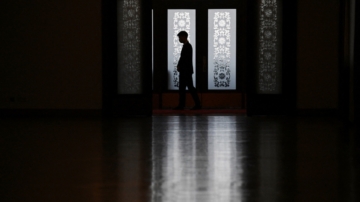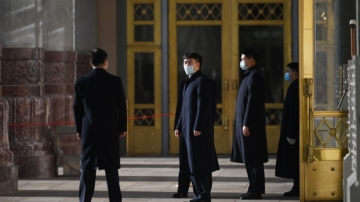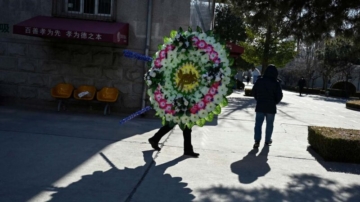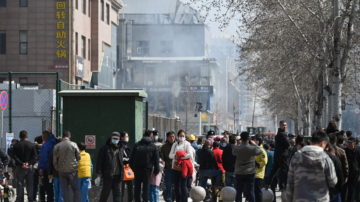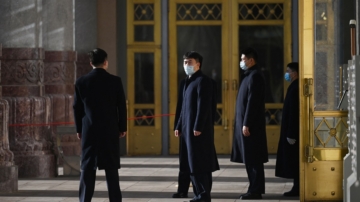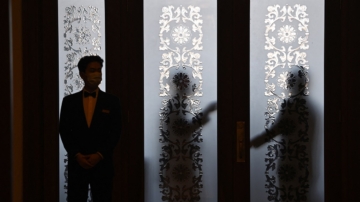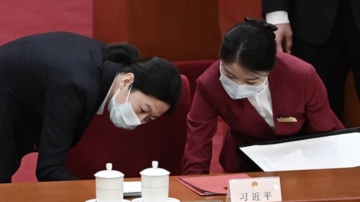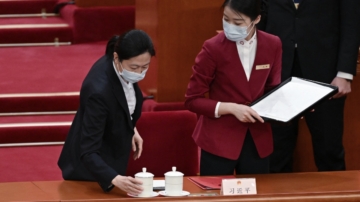【新唐人2014年03月07日訊】北京當局正在召開的「兩會」上,由政府工作報告披露,2014年中國的國防開支將增加12%以上,首次突破8千億元。消息一出,立刻引起國際社會的關注。為甚麼在沒有戰爭的情況下,國防開支連續多年持續增加?讓我們一起來看看專家如何解讀。
中共國務院總理李克強,日前在「兩會」的政府工作報告中說,2014年中國的國防開支將增加12.2%,升到8082.3億元。
據了解,2011年,中共軍費預算增長12.7%,2012年增長11.2%,2013年增長10.7%,至此已連續4年保持兩位數增長。官方聲稱,軍費將向武裝現代化傾斜。
香港《開放》雜誌編輯蔡詠梅:「中共實際上一直是有軍國主義的傾向的。『中國崛起』就是已經隱隱約約含有軍國主義的傾向。尤其近幾年,軍方少壯派軍人就公開叫囂『打核彈』、『轟炸東京』等等。只要這個體制不變,他們一定會加大軍費的一部分,對其他國家是有威脅的。」
中共當局宣佈軍費持續增加後,日本內閣官房長官菅義偉(Yoshihide Suga)表示,中共的國防政策和軍力缺乏透明度,令日本和國際社會感到擔憂。
美國國防部主管東亞事務的副助理部長大衛•海爾韋伊,日前也表示,美國關切中方缺乏的透明度,尤其是中共不斷增加軍事部署、對海上和領土主權問題採取強硬姿態。
大陸官方媒體報導,新增的軍費主要用於四個方面:一是,推動軍隊的科學發展,增加高新武器裝備;二是,推進後勤基礎設施建設﹔三為緩解物價上漲影響;四是推動反恐維穩等。
而中共駐香港的軍隊大約有6千人,包括陸軍、海軍和空軍,在1997年7月1號進駐香港。
蔡詠梅:「我們不相信:任何一個地方會對香港進行侵犯,那麼你駐軍隊在這邊是甚麼意思呢?現在中國的政治結構還是極權社會,那麼它的軍隊也是專政暴力機器的一部分。中國的國家機器這時候也有對內的一面。」
另外,從2012年開始,中共在東海、南海和多個周邊國家的關係越趨緊張。有猜測指出,這也是軍費不斷增加的原因之一。
旅美時事評論員藍述:「這不是最主要的。最根本的問題就是官民矛盾已經水火不容了,中共的統治越來越不穩了。在這種情況下,釣魚島這件事情上他它寧可不要石油,寧願將這個釣魚島作為一個支點,挑動國內的民主主義情緒。」
旅美時事評論員藍述認為,東海釣魚島是一個典型的例子,北京在轉移民眾對國內矛盾的注意力之餘,還要在軍費上加大投入,擺出戰爭姿態。另一方面,他認為,軍費遞增與中共的內鬥加劇有關。
藍述:「中共高層各個集團分贓越來越難以平衡,需要控制軍隊,所以大家都願意給軍隊增加軍費,討好軍隊。他控制了軍隊以後他才能控制最高權力。從去年到今年的增長速度比較快?說明第五代上臺以後,中共內部的派系鬥爭大大的加強了。」
據公開數據顯示,自1988年軍隊恢復軍銜制以來,中央軍委共授予96位高級軍官上將軍銜、和警銜。其中中共前領導人鄧小平授予了17位高級軍官上將軍銜,上屆領導人江澤民從1993年到2004年送出了上將軍銜、警銜79個,胡錦濤授予了10位將軍上將軍銜。
美國《華爾街日報》報導,國際戰略研究所(International Institute for Strategic Studies)所長約翰•奇普曼(John Chipman)曾表示,在這個充滿互相衝突的領土主張,以及長期存在潛在衝突熱點的地區,中共的軍費支出導致軍事採購不斷升溫。德國媒體也認為,中國大幅度增加軍費,將刺激亞洲的軍備競賽。
採訪編輯/唐音 後製/周天
In the Beijing parliamentary meetings, the Chinese Communist
Party (CCP) reported its 2014 defense budget.
The budget was raised more than 12% to over 800 billion yuan.
This announcement quickly drew world concerns.
Why does the CCP increase its defense spending
year after year during peace time?
The following is our experts’analysis.
The CCP head Li Keqiang said in the annual parliamentary
meetings that Chinese military spending will increase by 12.2%
to 808.23 billion yuan ($131.57 billion).
The CCP has continuously increased its national defense spend
by 12.7% in 2011, 11.2% in 2012, and 10.7% in 2013.
They claim the increased budget will facilitate the development
of more high-tech weapons.
Cai Yongmei, Hong Kong's Open Magazine editor: "The CCP
actually has a background of militarism.
The “Chinese Century” implied militarism, especially the
military Young Turks public clamor in recent years about
『nuclear war’, ‘bomb Tokyo’, and so on.
As long as the CCP remains, the defense budget will continue
to increase and threaten the international communities."
In responding to China’s military budget raise, Japanese Chief
Cabinet Secretary Yoshihide Suga said China's lack of
transparency is becoming an issue;
Not only for Tokyo, but also for the rest of the international
community, reported VOA.
Deputy Assistant Secretary of Defense (East Asia) at the United
States Department of Defense David Helvey commented:
"We remain concerned about a lack of transparency regarding
China's growing military and its increasingly assertive behavior
in the maritime domain," which was reported by Reuters.
The CCP state media reported the missions of the newly
increased budget:
To develop high-tech weapons;
To upgrade the logistics infrastructure;
To alleviate the impact of inflations;
To facilitate anti-terrorism and maintenance of stability.
In Hong Kong, there are Army, Navy and Air Force staff
stationed since July 1, 1997, and about 6,000 PLA troops.
Cai Yongmei: "We do not believe any attack will happen to
Hong Kong.
So why is the military stationed there?
The CCP, is a totalitarian dictatorship, the military is
certainly part of the dictatorship machinery.
This state machinery also targets the domestic environment."
The increasing military spending is also believed to partly in
response to the recent tense relations of China with neighboring
countries over issues of the East China Sea and South China Sea.
Lan Su, commentator: "I don’t think that’s a major issue.
I believe the fundamental problem is that conflict between the
party and the people has been so intense that it shakes the ruling
grip of the CCP.
The Diaoyu Island issue is not about the oil.
The CCP does not even care about it, but manipulates the issue of
the islands to provoke Chinese domestic democratic sentiment."
Commentator Lan Su takes the Diaoyu Islands in the East China
Sea as a typical example.
It helped the CCP to divert domestic conflict, serving as an
incentive to increase the budget in the name of preparing for war.
He also believes the budget increase reflects the intensified
infighting within the CCP.
Lan Su: "The spoils system within the CCP is getting more
difficult to balance among factions.
To control and please the army, everyone is in favor of increasing
the military spending.
Controlling the army means controlling the leadership.
The further budget increase from last year actually tells us the
factional struggle within the CCP since the 5th generation of
leadership took the power has gone up."
Since the regime re-established its military ranking system in
1988, the Central Military Commission has created 96 high-
ranking officers and generals.
Included are 17 by former CCP leader Deng Xiaoping,
79 by former leader Jiang Zemin between 1993 and 2004,
and 10 by former leader Hu Jintao.
In a press release by London-based International Institute for
Strategic Studies (IISS) on February 5, John Chipman, director-
general of IISS, stated:
"These outlays are fueling heightened military procurement in a
region replete with conflicting territorial claims as well as
long-standing potential flashpoints."
German media have also expressed similar concerns over the
elevated military procurement in Asia and China’s increasing
military spending.
中共國務院總理李克強,日前在「兩會」的政府工作報告中說,2014年中國的國防開支將增加12.2%,升到8082.3億元。
據了解,2011年,中共軍費預算增長12.7%,2012年增長11.2%,2013年增長10.7%,至此已連續4年保持兩位數增長。官方聲稱,軍費將向武裝現代化傾斜。
香港《開放》雜誌編輯蔡詠梅:「中共實際上一直是有軍國主義的傾向的。『中國崛起』就是已經隱隱約約含有軍國主義的傾向。尤其近幾年,軍方少壯派軍人就公開叫囂『打核彈』、『轟炸東京』等等。只要這個體制不變,他們一定會加大軍費的一部分,對其他國家是有威脅的。」
中共當局宣佈軍費持續增加後,日本內閣官房長官菅義偉(Yoshihide Suga)表示,中共的國防政策和軍力缺乏透明度,令日本和國際社會感到擔憂。
美國國防部主管東亞事務的副助理部長大衛•海爾韋伊,日前也表示,美國關切中方缺乏的透明度,尤其是中共不斷增加軍事部署、對海上和領土主權問題採取強硬姿態。
大陸官方媒體報導,新增的軍費主要用於四個方面:一是,推動軍隊的科學發展,增加高新武器裝備;二是,推進後勤基礎設施建設﹔三為緩解物價上漲影響;四是推動反恐維穩等。
而中共駐香港的軍隊大約有6千人,包括陸軍、海軍和空軍,在1997年7月1號進駐香港。
蔡詠梅:「我們不相信:任何一個地方會對香港進行侵犯,那麼你駐軍隊在這邊是甚麼意思呢?現在中國的政治結構還是極權社會,那麼它的軍隊也是專政暴力機器的一部分。中國的國家機器這時候也有對內的一面。」
另外,從2012年開始,中共在東海、南海和多個周邊國家的關係越趨緊張。有猜測指出,這也是軍費不斷增加的原因之一。
旅美時事評論員藍述:「這不是最主要的。最根本的問題就是官民矛盾已經水火不容了,中共的統治越來越不穩了。在這種情況下,釣魚島這件事情上他它寧可不要石油,寧願將這個釣魚島作為一個支點,挑動國內的民主主義情緒。」
旅美時事評論員藍述認為,東海釣魚島是一個典型的例子,北京在轉移民眾對國內矛盾的注意力之餘,還要在軍費上加大投入,擺出戰爭姿態。另一方面,他認為,軍費遞增與中共的內鬥加劇有關。
藍述:「中共高層各個集團分贓越來越難以平衡,需要控制軍隊,所以大家都願意給軍隊增加軍費,討好軍隊。他控制了軍隊以後他才能控制最高權力。從去年到今年的增長速度比較快?說明第五代上臺以後,中共內部的派系鬥爭大大的加強了。」
據公開數據顯示,自1988年軍隊恢復軍銜制以來,中央軍委共授予96位高級軍官上將軍銜、和警銜。其中中共前領導人鄧小平授予了17位高級軍官上將軍銜,上屆領導人江澤民從1993年到2004年送出了上將軍銜、警銜79個,胡錦濤授予了10位將軍上將軍銜。
美國《華爾街日報》報導,國際戰略研究所(International Institute for Strategic Studies)所長約翰•奇普曼(John Chipman)曾表示,在這個充滿互相衝突的領土主張,以及長期存在潛在衝突熱點的地區,中共的軍費支出導致軍事採購不斷升溫。德國媒體也認為,中國大幅度增加軍費,將刺激亞洲的軍備競賽。
採訪編輯/唐音 後製/周天
In the Beijing parliamentary meetings, the Chinese Communist
Party (CCP) reported its 2014 defense budget.
The budget was raised more than 12% to over 800 billion yuan.
This announcement quickly drew world concerns.
Why does the CCP increase its defense spending
year after year during peace time?
The following is our experts’analysis.
The CCP head Li Keqiang said in the annual parliamentary
meetings that Chinese military spending will increase by 12.2%
to 808.23 billion yuan ($131.57 billion).
The CCP has continuously increased its national defense spend
by 12.7% in 2011, 11.2% in 2012, and 10.7% in 2013.
They claim the increased budget will facilitate the development
of more high-tech weapons.
Cai Yongmei, Hong Kong's Open Magazine editor: "The CCP
actually has a background of militarism.
The “Chinese Century” implied militarism, especially the
military Young Turks public clamor in recent years about
『nuclear war’, ‘bomb Tokyo’, and so on.
As long as the CCP remains, the defense budget will continue
to increase and threaten the international communities."
In responding to China’s military budget raise, Japanese Chief
Cabinet Secretary Yoshihide Suga said China's lack of
transparency is becoming an issue;
Not only for Tokyo, but also for the rest of the international
community, reported VOA.
Deputy Assistant Secretary of Defense (East Asia) at the United
States Department of Defense David Helvey commented:
"We remain concerned about a lack of transparency regarding
China's growing military and its increasingly assertive behavior
in the maritime domain," which was reported by Reuters.
The CCP state media reported the missions of the newly
increased budget:
To develop high-tech weapons;
To upgrade the logistics infrastructure;
To alleviate the impact of inflations;
To facilitate anti-terrorism and maintenance of stability.
In Hong Kong, there are Army, Navy and Air Force staff
stationed since July 1, 1997, and about 6,000 PLA troops.
Cai Yongmei: "We do not believe any attack will happen to
Hong Kong.
So why is the military stationed there?
The CCP, is a totalitarian dictatorship, the military is
certainly part of the dictatorship machinery.
This state machinery also targets the domestic environment."
The increasing military spending is also believed to partly in
response to the recent tense relations of China with neighboring
countries over issues of the East China Sea and South China Sea.
Lan Su, commentator: "I don’t think that’s a major issue.
I believe the fundamental problem is that conflict between the
party and the people has been so intense that it shakes the ruling
grip of the CCP.
The Diaoyu Island issue is not about the oil.
The CCP does not even care about it, but manipulates the issue of
the islands to provoke Chinese domestic democratic sentiment."
Commentator Lan Su takes the Diaoyu Islands in the East China
Sea as a typical example.
It helped the CCP to divert domestic conflict, serving as an
incentive to increase the budget in the name of preparing for war.
He also believes the budget increase reflects the intensified
infighting within the CCP.
Lan Su: "The spoils system within the CCP is getting more
difficult to balance among factions.
To control and please the army, everyone is in favor of increasing
the military spending.
Controlling the army means controlling the leadership.
The further budget increase from last year actually tells us the
factional struggle within the CCP since the 5th generation of
leadership took the power has gone up."
Since the regime re-established its military ranking system in
1988, the Central Military Commission has created 96 high-
ranking officers and generals.
Included are 17 by former CCP leader Deng Xiaoping,
79 by former leader Jiang Zemin between 1993 and 2004,
and 10 by former leader Hu Jintao.
In a press release by London-based International Institute for
Strategic Studies (IISS) on February 5, John Chipman, director-
general of IISS, stated:
"These outlays are fueling heightened military procurement in a
region replete with conflicting territorial claims as well as
long-standing potential flashpoints."
German media have also expressed similar concerns over the
elevated military procurement in Asia and China’s increasing
military spending.

